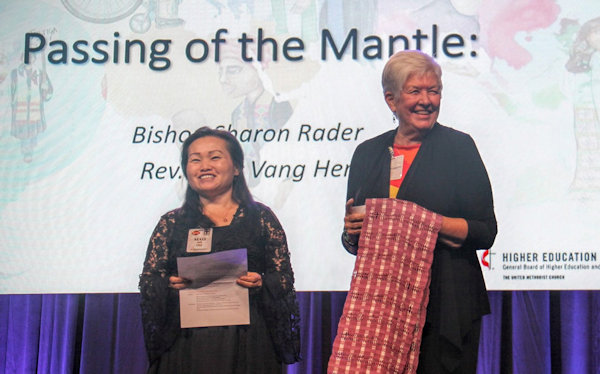Some 450 participants from 27 countries attended the Global United Methodist Clergywomen’s Gathering in Houston.
SAM HODGES
United Methodist News Service
The Revs. Leyda Yambot and Mercedita Antipolo, district superintendents in the Philippines, flew 18 hours to get to the 2016 Global United Methodist Clergywomen’s Gathering in Houston.
But any fatigue was trumped by gratitude and excitement to be among so many clergy sisters from all over the world.
“I am a new district superintendent, appointed last November,” Yambot said Aug. 30. “There are so many things I need to learn, and with all these seasoned leaders, I know I will gain so much.”
Antipolo echoed that, adding that she was getting a spiritual boost too.
“I feel the spirit,” she said. “During the worship service, I was crying.”
“It’s so critical for us to be together so we can offer support and encouragement to each other in our common mission to make disciples of Jesus Christ.” Bishop Laurie Haller
The 2016 Global United Methodist Clergywomen’s Gathering, put on by the denomination’s Board of Higher Education and Ministry, occurred Aug. 29-31, in connection with the World Methodist Conference.
Some 450 clergywomen, from 27 countries, came to Houston for a packed schedule of worship, fellowship and discussion of equity and justice issues under the theme “One: Birthing a Worldwide Church.”
This is the first global gathering of United Methodist clergywomen with a focus on the worldwide church, and scholarships for central-conference participants swelled and diversified the ranks, said the Rev. HiRho Park, director of clergy lifelong learning for Higher Education and Ministry’s Ordained Ministry Division.
Midway through the event, Park had just one complaint.
“It’s too short,” she said. “There’s so much we want to learn from one another.”
Paying tribute
The gathering spotlighted 2016 as the 60th anniversary of full clergy rights for Methodist women, as well as the 20th anniversary of full clergy membership for United Methodist deacons.
The liturgy in the opening worship noted other denominational milestones, such as the election of the Rev. Marjorie Matthews as the first woman bishop, the Rev. Leontine T.C. Kelly as the first African-American woman bishop, the Rev. Minerva Carcaño as the first Hispanic woman bishop and the Rev. Joaquina Filipe Nhanala as the first African woman bishop.
Six of seven just-elected women bishops in the United States were on hand in Houston, and got a prolonged ovation as they gathered on stage.
Another poignant moment came with a “passing the mantle” ceremony between retired Bishop Sharon Rader and the Rev. Mao Vang Her, who with her recent ordination in the Wisconsin Conference became the first Hmong woman to be a United Methodist elder.
Bishop Janice Riggle Huie, winding up her tenure as Texas Area episcopal leader, gave a keynote address. She paid tribute to early Methodist women leaders, especially Anna Howard Shaw, who was ordained by the Methodist Protestant Church in 1880, and who also was a physician and women’s suffrage champion.
“We stand at the end of a very long line of folks, women in particular, who made incredible sacrifices that we might be gathered here this evening,” Huie said at an Aug. 30 banquet.
Ongoing issues
But along with celebration, there was frank talk about lingering challenges in opportunity and equity for women clergy, as well the struggles denomination faces in living up to its worldwide church ideal.
In one of several panel discussions, the Rev. Anne Leighton Burkholder, associate dean of Methodist Studies at Candler School of Theology, pointed to obstacles facing women deacons in The United Methodist Church.
“I believe that the denomination is structured to ensure — and our weak theology of ordination and confused theology of sacraments actually does ensure — that the order of deacon will always be a second-class order,” Burkholder said.
The Rev. Alka Lyall, pastor of Broadway United Methodist Church in Chicago, noted that the election of women bishops has so far not included Asian-Americans or Pacific Islanders.
“Our church as a lot of work to do,” said Lyall, outgoing chair of the Asian American and Pacific Islander United Methodist Clergywomen Association.
Much of the talk focused on image vs. reality of the worldwide nature of The United Methodist Church, given how influenced the denomination is, including financially, by the U.S.
Newly elected Bishop Cynthia Moore-Koikoi, in a women bishops’ roundtable, called for doing away with the non-U.S. central conference structure.
“Our central conferences are a vestige of racism in the United States, and you can’t keep retrofitting that structure and expect we will have something global come out of it … It’s time for us to let that go and figure out we can be truly global,” she said.
Dawn Wiggins Hare, top executive of the Commission on the Status and Role of Women, urged those at the meeting to lobby in their annual or central conferences for approval of a constitutional amendment that passed at the 2016 General Conference. The amendment adds “gender” to the list of categories protected against discrimination in church life, something COSROW belives will help women across the global connection.
Germany Area Bishop Rosemarie Wenner noted during the bishops’ roundtable that she came into the Council of Bishops as a woman and a “foreigner.” Other women bishops took the lead in showing her the ropes and helping her feel comfortable, she said.
The Houston gathering was important in the same way, according to newly elected Bishop Laurie Haller.
“It’s so critical for us to be together so we can offer support and encouragement to each other in our common mission to make disciples of Jesus Christ,” she said.
Last Updated on December 16, 2022

